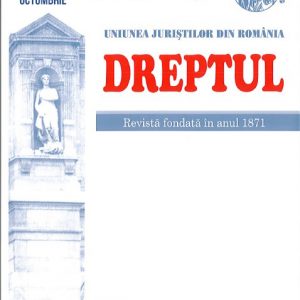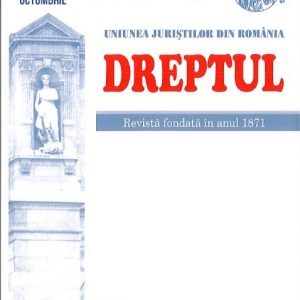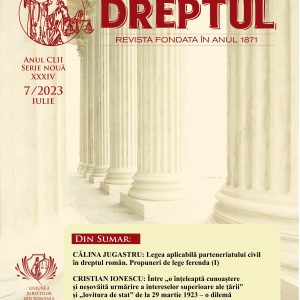-
 This study has as object the incidental regulations in the matter of illegal border crossings and of asylum, as well as how they intersect, and it intends to find an adequate solution for what happens with the criminal prosecution, in the cases of fraudulent crossings of the state border, in the course of solving the application for being granted a form of protection submitted by the person who has illegally crossed the border. It is proposed the intervention of the legislator in the sense of introducing a rule which provides as cause of suspension of the criminal prosecution the situation where the person wanted for the fraudulent crossing of the state border has subsequently submitted an application for being granted a form of protection and is subject to the asylum procedure. The need for such intervention is motivated by the ineffectiveness of continuing the criminal prosecution and of the settlement of the case provided that, at the end of the asylum procedure, the person concerned can be granted a form of protection from among those recognized by the Law No 122/2006, the cause of non-punishment provided in Article 11 of this law being thus incidental.
This study has as object the incidental regulations in the matter of illegal border crossings and of asylum, as well as how they intersect, and it intends to find an adequate solution for what happens with the criminal prosecution, in the cases of fraudulent crossings of the state border, in the course of solving the application for being granted a form of protection submitted by the person who has illegally crossed the border. It is proposed the intervention of the legislator in the sense of introducing a rule which provides as cause of suspension of the criminal prosecution the situation where the person wanted for the fraudulent crossing of the state border has subsequently submitted an application for being granted a form of protection and is subject to the asylum procedure. The need for such intervention is motivated by the ineffectiveness of continuing the criminal prosecution and of the settlement of the case provided that, at the end of the asylum procedure, the person concerned can be granted a form of protection from among those recognized by the Law No 122/2006, the cause of non-punishment provided in Article 11 of this law being thus incidental. -
 This study proposes the approach of an identified problem with regard to the regulation of the manner of applying the complementary punishment of prohibition to exercise some rights. By the analysis made within this study, the author identifies a situation of inequity which can arise in precise cases between the case of the sentenced person conditionally released from serving the punishment of life imprisonment and the case of the conditionally released person sentenced to imprisonment in detention.
This study proposes the approach of an identified problem with regard to the regulation of the manner of applying the complementary punishment of prohibition to exercise some rights. By the analysis made within this study, the author identifies a situation of inequity which can arise in precise cases between the case of the sentenced person conditionally released from serving the punishment of life imprisonment and the case of the conditionally released person sentenced to imprisonment in detention. -

-
 Este foarte dificilă cercetarea noțiunei de ordine publică și determinarea conținutului acestei noțiuni este cu totul anevoioasă. Nu există, poate, în drept și în sociologie, o mai confuză noțiune, dar care să-și găsească mai variate câmpuri de aplicație și de care să se facă uz mai des, mai ales în ultimele timpuri, atât în relațiile particulare dintre indivizi, cât și în legăturile și raporturile dintre Stat și individ de o parte sau dintre State, de altă parte. Stabilirea conținutului exact al ordinei publice și analizarea tuturor efectelor sale depășesc cu mult cadrul normal al unui articol, chiar mai lung, dintr’o revistă juridică. Vom căuta totuși, în cele ce urmează, a schița rapid datele problemei, fără a pretinde că, în acest fel, am epuizat subiectul; de altminteri, intenția noastră nu este decât de a face o sumară introducere în examinarea acestui subiect a cărui analiză poate face obiectul unui întreg tratat.
Este foarte dificilă cercetarea noțiunei de ordine publică și determinarea conținutului acestei noțiuni este cu totul anevoioasă. Nu există, poate, în drept și în sociologie, o mai confuză noțiune, dar care să-și găsească mai variate câmpuri de aplicație și de care să se facă uz mai des, mai ales în ultimele timpuri, atât în relațiile particulare dintre indivizi, cât și în legăturile și raporturile dintre Stat și individ de o parte sau dintre State, de altă parte. Stabilirea conținutului exact al ordinei publice și analizarea tuturor efectelor sale depășesc cu mult cadrul normal al unui articol, chiar mai lung, dintr’o revistă juridică. Vom căuta totuși, în cele ce urmează, a schița rapid datele problemei, fără a pretinde că, în acest fel, am epuizat subiectul; de altminteri, intenția noastră nu este decât de a face o sumară introducere în examinarea acestui subiect a cărui analiză poate face obiectul unui întreg tratat. -
 Article 78 of the Civil Procedure Code, paradoxically, evokes through its title an apparent exception to the principle of availability, however, through its content, it constitutes a confirmation of this principle. Given this apparent contradiction, it must be clarified whether, in the case provided in Article 78 (2) of the Civil Procedure Code, the party requesting the introduction of the third party in the trial after the judge has questioned the necessity of its introduction may formulate any new heads of claim involved in the enlargement, in this way, of the procedural framework. Also due to the phrase „ex officio” attached to this introduction, it must be concluded whether, for these possible new heads of claim, related to the introductory request, the requesting party must pay judicial stamp duty or, due to this reference to officiality, the party is exempted from such obligation. It must also be established whether to these new heads of claim it can be opposed the exception implied by the sanction of loss, referred to in Article 204 of the Civil Procedure Code, in the conditions in which they would be related to the introductory request.
Article 78 of the Civil Procedure Code, paradoxically, evokes through its title an apparent exception to the principle of availability, however, through its content, it constitutes a confirmation of this principle. Given this apparent contradiction, it must be clarified whether, in the case provided in Article 78 (2) of the Civil Procedure Code, the party requesting the introduction of the third party in the trial after the judge has questioned the necessity of its introduction may formulate any new heads of claim involved in the enlargement, in this way, of the procedural framework. Also due to the phrase „ex officio” attached to this introduction, it must be concluded whether, for these possible new heads of claim, related to the introductory request, the requesting party must pay judicial stamp duty or, due to this reference to officiality, the party is exempted from such obligation. It must also be established whether to these new heads of claim it can be opposed the exception implied by the sanction of loss, referred to in Article 204 of the Civil Procedure Code, in the conditions in which they would be related to the introductory request. -
 This article addresses the matter of the correct legal classification of the introduction of drugs into the country for personal use. Our attention was drawn whereas not only that the judicial practice of the national courts and the specialized literature are not unitary in terms of legal classification, but even the High Court of Cassation and Justice has pronounced diametrically opposed solutions. Within the paper, it is performed an analysis of the incidental texts of law and of the judicial practice in the field, as well as some aspects of legislative technique and criminal policy.
This article addresses the matter of the correct legal classification of the introduction of drugs into the country for personal use. Our attention was drawn whereas not only that the judicial practice of the national courts and the specialized literature are not unitary in terms of legal classification, but even the High Court of Cassation and Justice has pronounced diametrically opposed solutions. Within the paper, it is performed an analysis of the incidental texts of law and of the judicial practice in the field, as well as some aspects of legislative technique and criminal policy. -

-
 Cybercrime has become a serious threat to the fundamental rights of individuals, to the rule of law in cyberspace and to the functioning of democratic societies. Cloud Computing provides several benefits such as increased flexibility, scalability and reduced cost. However, it also provides several challenges for digital forensics and criminal investigators. In an investigation involving Cloud Computing services, investigators may seek access to the data held on computer systems located in foreign jurisdictions, held by foreign service providers or where the physical location of the data is unknown. Despite a growing adoption of Cloud Computing, law enforcement agencies and the judicial system are unprepared to prosecute Cloud-based crimes. This article considers various forensic challenges for law enforcement in a Cloud Computing environment and discusses measures against cybercrime, involving electronic evidence given the transnational and volatile nature of electronic evidence. By focusing on problems and solutions we examine the whole extent of legal measures that need to be implemented.
Cybercrime has become a serious threat to the fundamental rights of individuals, to the rule of law in cyberspace and to the functioning of democratic societies. Cloud Computing provides several benefits such as increased flexibility, scalability and reduced cost. However, it also provides several challenges for digital forensics and criminal investigators. In an investigation involving Cloud Computing services, investigators may seek access to the data held on computer systems located in foreign jurisdictions, held by foreign service providers or where the physical location of the data is unknown. Despite a growing adoption of Cloud Computing, law enforcement agencies and the judicial system are unprepared to prosecute Cloud-based crimes. This article considers various forensic challenges for law enforcement in a Cloud Computing environment and discusses measures against cybercrime, involving electronic evidence given the transnational and volatile nature of electronic evidence. By focusing on problems and solutions we examine the whole extent of legal measures that need to be implemented. -

-
 Examining art. 201 of Law No. 71/2011 for the implementation of the new Civil Code (Law No. 287/2009, republished on July 15, 2011) in conjunction with art. 6 paragraph (4) of the said Code, the author concludes that judicial bodies (judiciary authorities and arbitration courts) can, ex officio and at any stage of the trail, claim the limitation periods that have begun under the former regulation (Article 18 of Decree No. 167/1958) as well, regardless of whether such limitation periods have been met or not until the entry into force of the new Civil Code; subsequently, only the limitation periods which have begun after October 1st, 2011 (the date of entry into force of the new Civil Code) shall be able to be claimed exclusively by the interested party and only until the first term the parties were duly summoned at (this according to art. 2513 of the new Civil Code).
Examining art. 201 of Law No. 71/2011 for the implementation of the new Civil Code (Law No. 287/2009, republished on July 15, 2011) in conjunction with art. 6 paragraph (4) of the said Code, the author concludes that judicial bodies (judiciary authorities and arbitration courts) can, ex officio and at any stage of the trail, claim the limitation periods that have begun under the former regulation (Article 18 of Decree No. 167/1958) as well, regardless of whether such limitation periods have been met or not until the entry into force of the new Civil Code; subsequently, only the limitation periods which have begun after October 1st, 2011 (the date of entry into force of the new Civil Code) shall be able to be claimed exclusively by the interested party and only until the first term the parties were duly summoned at (this according to art. 2513 of the new Civil Code). -

-
 On 2 November 2020, it was published in the Official Journal of Romania, Part I, No 1019, the Law No 228/2020 for the amendment and completion of some normative acts in the criminal field in order to transpose some directives of the European Union (hereinafter, the Law No 228/2020), an act that modifies and completes both Law No 286/2009 regarding the Criminal Code and Law No 135/2010 on the Code of Criminal Procedure. Among the changes made by the legislator in the Criminal Code is the introduction of the extended confiscation in the case of third parties (which I will generically call „third party acquirers”) so that, taking into account this newly introduced hypothesis, this study aims, in a first stage, to address the issue, starting from the evolution of the institution of extended confiscation from the perspective of the european and national legislative framework, then continuing with a brief analysis of the changes made by Law No 228/2020. Finally, the article examines the possibility of ordering the extended confiscation security measure in the case of third parties in relation to the relevant doctrine and jurisprudence in this matter. In a second stage, the present study aims to examine from a procedural perspective the guarantees imposed by Directive (EU) 2014/42 and which the Romanian legislator, in order to respect the right to a fair trial, provides to the third party acquirer during the criminal proceedings, with a closer look at the existence of an effective remedy for the decisions of the courts of appeal which order for the first time the measure of extended confiscation. Also, this part analyzes the possible quality that the acquiring third party has during the criminal process. Finally, before drawing conclusions on those analyzed, it will also be shown how the other Member States have provided/transposed into their national legislation the particular hypothesis of extended confiscation in the case of third parties.
On 2 November 2020, it was published in the Official Journal of Romania, Part I, No 1019, the Law No 228/2020 for the amendment and completion of some normative acts in the criminal field in order to transpose some directives of the European Union (hereinafter, the Law No 228/2020), an act that modifies and completes both Law No 286/2009 regarding the Criminal Code and Law No 135/2010 on the Code of Criminal Procedure. Among the changes made by the legislator in the Criminal Code is the introduction of the extended confiscation in the case of third parties (which I will generically call „third party acquirers”) so that, taking into account this newly introduced hypothesis, this study aims, in a first stage, to address the issue, starting from the evolution of the institution of extended confiscation from the perspective of the european and national legislative framework, then continuing with a brief analysis of the changes made by Law No 228/2020. Finally, the article examines the possibility of ordering the extended confiscation security measure in the case of third parties in relation to the relevant doctrine and jurisprudence in this matter. In a second stage, the present study aims to examine from a procedural perspective the guarantees imposed by Directive (EU) 2014/42 and which the Romanian legislator, in order to respect the right to a fair trial, provides to the third party acquirer during the criminal proceedings, with a closer look at the existence of an effective remedy for the decisions of the courts of appeal which order for the first time the measure of extended confiscation. Also, this part analyzes the possible quality that the acquiring third party has during the criminal process. Finally, before drawing conclusions on those analyzed, it will also be shown how the other Member States have provided/transposed into their national legislation the particular hypothesis of extended confiscation in the case of third parties.
